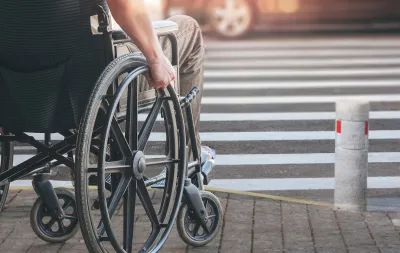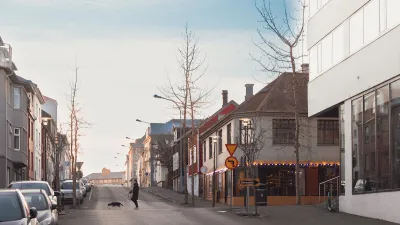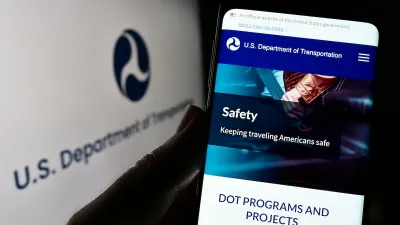A new study highlights the challenges people with disabilities continue to face in navigating urban spaces.

In a piece in Greater Good Magazine, Mohsen Rasoulivalajoozi and Carmela Cucuzzella outline ways that cities can make urban spaces more inclusive for people with disabilities and mobility challenges.
According to the authors, “To create truly inclusive cities, it is vital for policymakers and experts to go beyond minimum standards and critically examine how our urban spaces continue to exclude people with disabilities.”
Some people who require mobility devices face a financial burden in getting safe, well-fitting, and effective equipment. This can create a mismatch between users and mobility aids, which may also not match the environment people must navigate on a daily basis. “However, integrating new technologies requires careful consideration, as assistive devices can also attract social stigma.”
The authors also point to trust as a key factor in whether people want to use mobility aids or facilities designed to improve accessibility, as well as the importance of sociocultural contexts in how people navigate their environment and use mobility aids. “By addressing negative representations and promoting designs that reflect dignity and inclusivity, interventions can align with inclusivity goals and enhance positive social engagement.”
FULL STORY: Four Ways Cities Could Be More Inclusive for Mobility Challenges

Planetizen Federal Action Tracker
A weekly monitor of how Trump’s orders and actions are impacting planners and planning in America.

Maui's Vacation Rental Debate Turns Ugly
Verbal attacks, misinformation campaigns and fistfights plague a high-stakes debate to convert thousands of vacation rentals into long-term housing.

Cuomo Is the Candidate of Both NIMBYs and Developers. What Gives?
In the New York City mayoral race, odd bedfellows align to preserve the housing status quo.

San Antonio and Austin are Fusing Into one Massive Megaregion
The region spanning the two central Texas cities is growing fast, posing challenges for local infrastructure and water supplies.

Charlottesville Temporarily Has No Zoning Code
A judge ordered the Virginia city to throw out its newly revised zoning code, leaving permitting for new development in legal limbo.

In California Battle of Housing vs. Environment, Housing Just Won
A new state law significantly limits the power of CEQA, an environmental review law that served as a powerful tool for blocking new development.
Urban Design for Planners 1: Software Tools
This six-course series explores essential urban design concepts using open source software and equips planners with the tools they need to participate fully in the urban design process.
Planning for Universal Design
Learn the tools for implementing Universal Design in planning regulations.
Heyer Gruel & Associates PA
JM Goldson LLC
Custer County Colorado
City of Camden Redevelopment Agency
City of Astoria
Transportation Research & Education Center (TREC) at Portland State University
Jefferson Parish Government
Camden Redevelopment Agency
City of Claremont





























